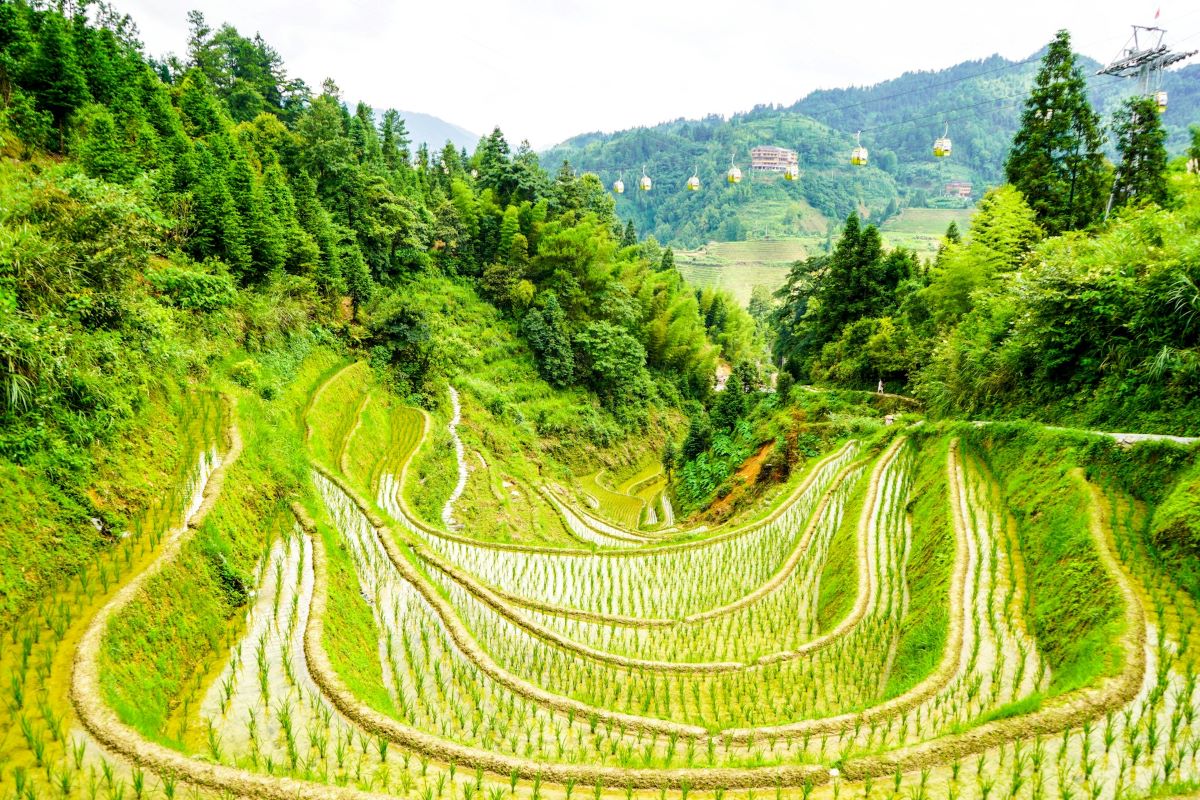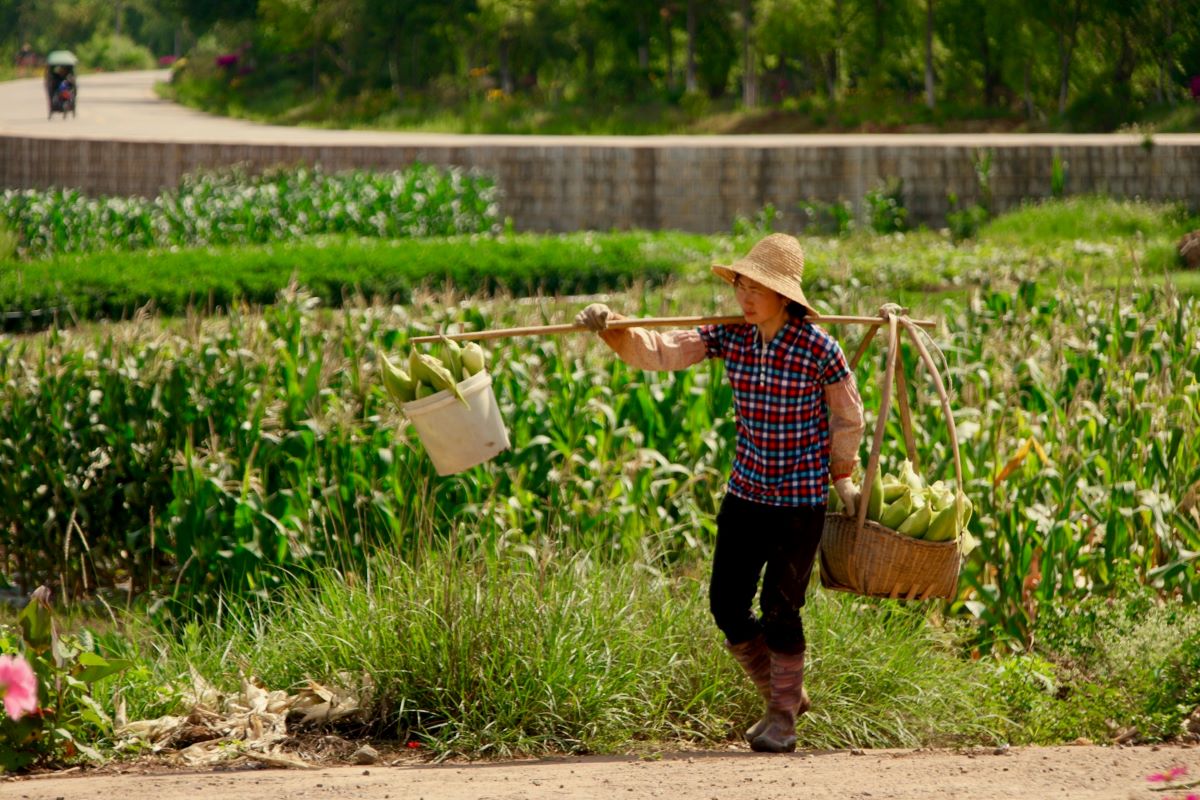Table of Contents
ToggleThe China agriculture industry is a powerhouse that plays a crucial role in feeding its vast population and contributing to the global food supply. With a history stretching back thousands of years, the China agriculture practices have evolved significantly, transforming the nation into one of the world’s largest producers of rice, wheat, and other staple crops. Let’s examine the importance of China agriculture, exploring its historical roots and its pivotal role in the global economy.
Key Factors Driving China’s Agricultural Growth
Historical Context
China agriculture has deep roots, dating back thousands of years. Historically, the country has relied heavily on rice and wheat cultivation, with regions like the Yangtze River Valley and the North China Plain serving as key agricultural zones. Traditional farming techniques, such as terrace farming and the use of hand tools, dominated the landscape for centuries. These methods, while labour-intensive, enabled China to feed its growing population.
Modernisation
The latter half of the 20th century marked a significant shift in China agriculture. The introduction of the Household Responsibility System in the late 1970s allowed farmers to make independent production decisions, leading to increased productivity and efficiency. This reform was pivotal, as it transformed agriculture from a collectivist approach to one that incentivized individual farmers.
Technological Advancements
Technological innovation is a driving force behind the rapid growth of China’s agriculture industry. The adoption of modern farming techniques, such as precision agriculture, has enabled farmers to increase crop yields and improve the efficiency of resource use. Utilising drones for crop monitoring and automated irrigation systems has become common practice, leading to better crop management and reduced labour costs.
Government Policies
China’s government has implemented numerous policies to support and stimulate agricultural development. Subsidies, grants, and favourable loans have been provided to farmers, encouraging them to adopt new technologies and sustainable practices. Additionally, initiatives like the Rural Revitalisation Strategy aim to boost the rural economy and improve living standards for farmers, further driving agricultural growth.
International Trade
The China agriculture industry greatly benefits from its robust trade relations with countries worldwide. Exporting agricultural products, such as soybeans, fruits, and vegetables, has allowed China to generate significant revenue and strengthen its position in the global marketplace. Furthermore, the import of advanced agricultural machinery and technology from other countries has facilitated the industry’s modernisation and growth.
Read more: The Evolution and Future of China’s Manufacturing Industry
Challenges Faced by the Industry
Environmental Concerns
The China agriculture sector faces numerous environmental challenges, including soil degradation, water scarcity, and pollution. Intensive farming practices have led to the depletion of soil nutrients, making it difficult to maintain high crop yields. Additionally, the overuse of chemical fertilisers and pesticides has contributed to water contamination and adverse health effects on both farmers and consumers.
Rural-Urban Migration
The migration of rural populations to urban areas poses a significant challenge to the China agriculture industry. With more people leaving the countryside in search of better job opportunities, the agricultural workforce is dwindling. This labour shortage has made it increasingly difficult for farmers to manage their fields and maintain crop production levels, further exacerbating the industry’s challenges.
Food Security Issues
Ensuring food security is a constant concern for the China agriculture industry. The increasing demand for food, driven by population growth and rising incomes, has put immense pressure on the sector to produce more with limited resources. Climate change and extreme weather events also threaten food production, making it crucial for China to develop resilient agricultural practices to secure its food supply.
Innovations and Solutions
Sustainable Farming Practices
To address the challenges faced by the China agriculture industry, many farmers are adopting sustainable practices to improve efficiency and reduce environmental impact. Crop rotation, organic farming, and integrated pest management are some of the methods being implemented to promote soil health and biodiversity. These practices help maintain long-term productivity while minimising harm to the environment.
Smart Agriculture Technologies
The integration of smart agriculture technologies is revolutionising China’s farming landscape. Internet of Things (IoT) devices, artificial intelligence (AI), and big data analytics enable farmers to monitor and manage their crops more effectively. For example, AI-powered systems can predict pest outbreaks and recommend targeted interventions, reducing the need for chemical pesticides and enhancing crop protection.
Renewable Energy Solutions
Renewable energy sources, such as solar and wind power, are increasingly being utilised in the China agriculture industry to reduce reliance on fossil fuels and lower greenhouse gas emissions. Solar panels installed on farms can generate electricity for irrigation systems and other equipment, while wind turbines provide a sustainable energy source for rural communities. These renewable energy solutions contribute to a greener and more resilient agricultural sector.
Read more: Powering the Future: Exploring China’s Renewable Energy Industry

Impact on Global Agriculture
Trade Relations and Partnerships
The China agriculture industry significantly impacts global trade relations and partnerships. By exporting a wide range of agricultural products, China plays a vital role in meeting the food demands of other countries. Additionally, China’s investments in agricultural projects abroad, such as land acquisitions and infrastructure development, further strengthen its influence on the global agricultural landscape.
Technological Exchange
The exchange of agricultural technologies and expertise between China and other countries has led to significant advancements in farming practices worldwide. Collaborative research and development initiatives have resulted in the creation of innovative solutions that benefit farmers globally. For instance, China’s experience with hybrid rice cultivation has been shared with other rice-producing nations, helping them increase their crop yields and improve food security.
Shaping the Future of Farming
The China agriculture industry is shaping the future of farming by setting an example for other countries to follow. The adoption of cutting-edge technologies, commitment to sustainable practices, and focus on improving efficiency have positioned China as a leader in agricultural innovation. As other nations look to emulate China’s success, the global agricultural sector stands to benefit from the shared knowledge and best practices.
Read more: China’s Tech Industry: A Deep Dive into the Thriving Tech Powerhouse
Opportunities for Business Owners and Agriculture Enthusiasts
Investment Opportunities
The China agriculture industry presents numerous investment opportunities for business owners and agriculture enthusiasts. By investing in agricultural projects, businesses can tap into the growing demand for food and agricultural products, generating significant returns. Additionally, investing in the development and implementation of innovative farming technologies can help address the industry’s challenges and contribute to its long-term growth.
Market Entry Strategies
Entering the China agriculture market requires a well-thought-out strategy to ensure success. Understanding the local market dynamics, regulatory environment, and consumer preferences is crucial for businesses looking to establish a presence in the industry. Collaborating with local partners, participating in trade shows, and leveraging government support programs can help businesses navigate the complexities of the market and achieve their goals.
Collaboration Ideas
Collaboration is key to driving innovation and addressing the challenges faced by the China agriculture industry. Businesses can partner with research institutions, universities, and government agencies to develop and implement new technologies and sustainable practices. Additionally, forming alliances with other agricultural companies can facilitate knowledge exchange and promote the adoption of best practices across the industry.
Conclusion and Call to Action
The China agriculture industry is a dynamic and rapidly evolving sector with immense potential for growth and innovation. By understanding the key factors driving its success, addressing the challenges it faces, and exploring the opportunities available, business owners and agriculture enthusiasts can play a crucial role in shaping the future of global farming.
Interested in expanding to China? With our over 15 years of experience serving the Asian market, Eos Global Expansion is ready to help. Our Employer of Record (EoR) services will take care of the administrative duties so you can focus on your core business. Check out our services here or contact us directly.
Featured photo by Matt Briney on Unsplash







